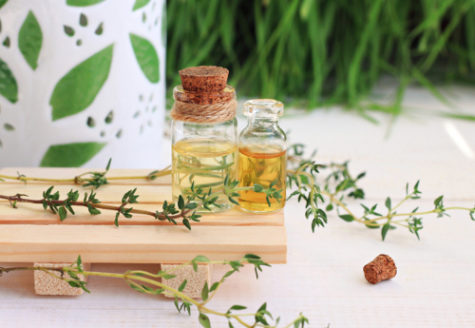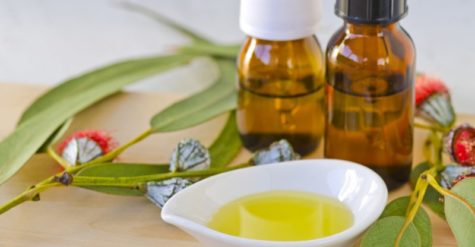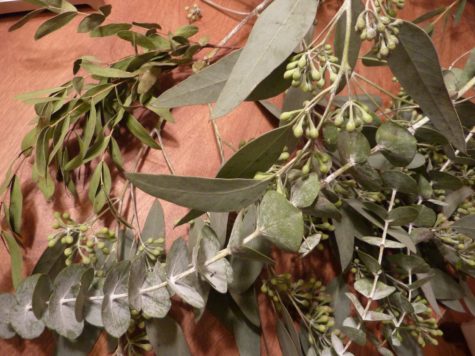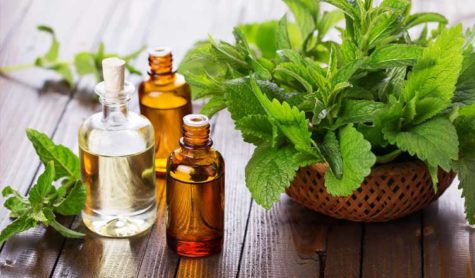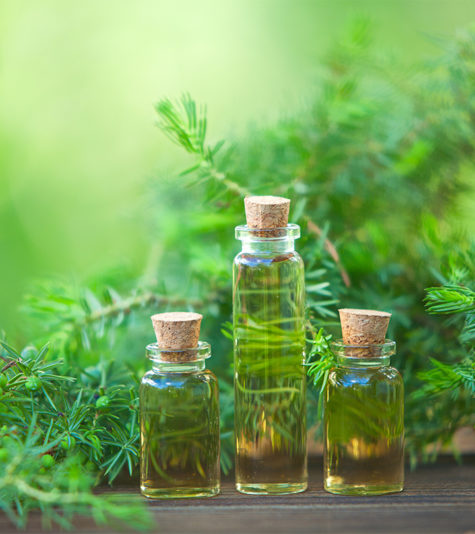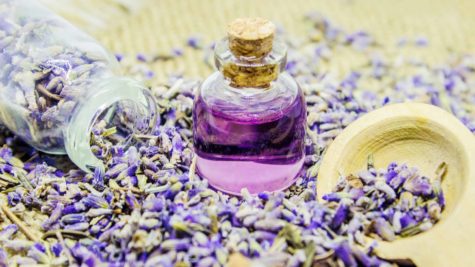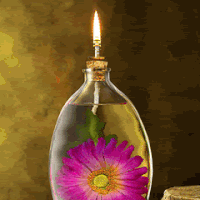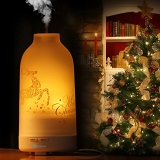Insect Repellent
Bugs Be Gone Room Spray
You can use essential oils to make a bug-repelling room spray that can be used inside or out. This blend of Lavender, Peppermint, Lemongrass, and Lemon Eucalyptus oils is great for keeping away all kinds of bugs (mosquitoes, flies, gnats, spiders, and more). Plus, it has a wonderful fresh scent.
To make room spray:
- Fill 8 oz glass spray bottle about 3/4 full with distilled water
- Fill most of the rest of the way full with Witch Hazel
- 10 drops Lavender essential oil
- 10 drops Peppermint essential oil
- 10 drops Lemongrass essential oil
- 10 drops Lemon Eucalyptus essential oil
- Put on sprayer top and shake well to mix
To use: Shake bottle gently before each use. Spray into the air to freshen room. Use as often as needed.
Source: One Essential Community
Thyme Essential Oil
There are many types of thyme, some of which can be used safely in all situations and some which cannot. Thyme oil ranks high on the versatility index of essential oils. Diffused, it boosts wellness, fortifying the lungs and clearing the breath.
Thyme has notable antiviral, antibiotic, antiseptic, and diuretic properties and should be used with great care.
- Application:
Thyme oil should never be used undiluted on the skin. It can be applied topically at very low dilutions of 1% or less or used in a blend as a compress. It may also be used in direct inhalation or diffused. Add to food or soy / rice milk as a dietary supplement or flavoring.
- Fragrant Influence:
It may be beneficial in helping to overcome fatigue and exhaustion after illness.
- Safety Data:
Overuse of Thyme essential oil can stimulate the thyroid gland and lymphatic system. Like many good things, it must be used in moderation. It should never be applied to the skin undiluted and should not be used on children unless it is within the chemotype Thyme linalol. It can be irritating for the mucus membranes and it should not be used by those who are pregnant.
Thyme is a vital component of the Basic Care Kit because of its powerful antiviral properties. When flu is around it is a wonderful oil to have on the diffuser. It assists in the elimination of toxic wastes from the body. It is used in the treatment of a wide range of conditions including whooping cough, warts, rheumatism, neuralgia, fatigue, and acne.
Inhaled, Thyme oil is uplifting and relieves depression, stimulates the respiratory system and relieves the spasm of asthma, is an antiseptic for all sorts of muccoid conditions, kills bacteria in the air, and is used for bronchitis or pneumonia. Thyme oil is also mildly sedating and can be used for insomnia.
Internal dose is three to five drops in honey water three times a day.
It is also extremely useful in antiseptic powders, hair and skin care regimes, and cooking. Just to make it a perfect all-rounder, thyme will discourage all manner of parasites and insects from invading your home.
In Greek, “thymos” means “to perfume”; one of thyme’s many traditional uses was in fumigation. Ancient Egyptians used thyme oil for embalming. In many ancient cultures, it was believed that thyme instilled the virtues of strength, energy, and bravery.
Variations
There are six different chemotypes of T. vulgaris:
- Thymol – low altitude close to the sea
- Carvacrol – low altitude close to the sea
- Linalool – in the sun on exposed slopes
- Geraniol – rare and mixed with linalool at high altitudes
- Thuyan-4-ol – very rare and located between thymol/carvacrol and linalool
- α-terpinyl – in the Eastern Mediterranean
Thyme Linalol is especially recommended to kill bacteria and relieve discomfort. It is non-irritating and gentle, and especially recommended for treating children and the elderly or infirm.
Thyme Thuyanol is quite new. It captures much of the overall strength and stimulating properties of the “regular” essence of Thyme as well as its anti-infectious properties. The difference lies in the much higher content of highly desirable terpene alcohols (non-toxic) and the much lower content of irritant and slightly toxic phenols. This oil is stronglhy germicidal (yet non-irritant) and a very good liver stimulant.
Information collected from various sources
Eucalyptus Essential Oil
Eucalyptus has been distilled from at least 1788 when two doctors, John White and Dennis Cossiden, distilled Eucalyptus piperata for its use in treating chest problems and colic. This was in Australia where the Blue Mountains of New South Wales are so called because of the extraordinary blue haze that exudes from the resin of the eucalyptus gum and envelops the entire landscape. In such a powerfully aromatic environment, the medicinal qualities of this ancient tree would be hard to miss.
There is a wide range of eucalyptus varieties, any one of which would be a useful addition to a Basic Care Kit. Eucalyptus oil is steam-distilled from a number of different variations of the tree Eucalyptus spp. Each of these oils are from one specified chemical race, rather like Zinfadel wine is of one variety but each vineyard produces a Zinfadel of a particular quality and taste.
Generalities:
Eucalyptus is a marvelously versatile and useful oil. It cools the body in summer and protects it in winter. It is antinflammatory, antiseptic, antibiotic, diuretic, analgesic, and deodorizing. Research has proved its antiviral properties as well.
It is best known for its effectiveness against coughs and colds but is equally effective in the treatment of cystitis, candida, diabetes, and sunburn, while also being useful in veterinary care and as an insect repellent.
In general, Eucalyptus oil is used as a specific for the respiratory system. It is an antiseptic stimulant with a very specific balsamic odor that can only be described as smelling like Eucalyptus. This oil has great value in a vaporizer to stimulate and loosen bronchial secretions so that they can be coughed up, and is used primarily for coughs, colds, bronchial infections and asthma. Eucalyptus oil is very effective in killing bacteria and for clearing the system when used in a vaporizer. It is antiviral and cooling.
Eucalyptus citriodora
Also known as Lemon Eucalyptus or Lemon-Scented Gum. Eucalyptus citriodora has been used to perfume linen closets, and as an insect repellent, especially for cockroaches and silverfish.
- Application:
Diffuse or rub on bottom of feet or on location
- Fragrant Influence:
Has a sweet, strong, camphorous, fresh lemony scent. Citronella like. It promotes health, well being, purification, and healing.
- Safety Data:
If pregnant or under a doctor’s care, consult your physician, Do not take internally.
Also used for asthma, athlete’s foot and other fungal infections, respiratory infections, cuts, dandruff, fevers, herpes, infectious skin conditions, laryngitis, scabs, shingles, sore throat, sores and wounds.
Eucalyptus dives
This species has a different, more specific antibacterial action than other eucalyptus oils.
- Application:
Apply topically or diffuse. Avoid direct inhalation.
- Fragrant Influence:
It promotes health, well being, purification, and healing.
- Safety Data:
If pregnant or under a doctor’s care, consult your physician.
Containing low amounts of eucalyptol, Eucalyptus dives is mild and gentle. This variety is ideal for topical application.
Eucalyptus globulus
Also known as Blue-Gum or Tasmanian Blue Gum Eucalyptus. This essential oil usually has the highest 1,8-cineole levels and is heavily cultivated in Portugal, Spain and China.
For centuries Australian Aborigines used the leaves as a disinfectant to cover wounds. Shown by laboratory tests to be a powerful antimicrobial agent, E globulus contains a high percentage of eucalyptol (a key ingredient in many antiseptic mouth rinses). Often used for the respiratory system, eucalyptus has been investigated for its powerful insect repellent effects.
- Application:
Apply topically, diffuse, or use in a humidifier.
- Fragrant Influence:
It promotes health, well being, purification, and healing. A fresh, strong, uplifting scent that is medicinal, herbal and clean. A typical Eucalyptus odor.
- Safety Data:
If pregnant or under a doctor’s care, consult your physician. Do not take internally.
Eucalyptus trees have been planted throughout parts of North Africa to successfully block the spread of malaria. According to Jean Valnet, MD, a solution of 2% eucalyptus oil sprayed in the air will kill 70% of airborne staph bacteria. Some doctors still use solutions of eucalyptus oil in surgical dressings.
This oil may be used for aches and pains, acne, allergies, arthritis, bronchitis, burns, decongestant, respiratory infections, cystitis, endometriosis, increasing energy, gonorrhea, inflammation of the ear, eye, and sinus, malaria, rheumatism, respiratory infections, skin and throat infection or sores, ulcers, vaginitis, and wounds.
Eucalyptus polybractea
Used for acne and cystitis.
- Application:
Diffuse or apply topically, or use in a humidifier
- Fragrant Influence:
It promotes health, well being, purification, and healing.
- Safety Data:
If pregnant or under a doctor’s care, consult your physician. Do not take internally.
Containing 95% Eucalyptol, Eucalyptus polybractea is one of the most potent of the Eucalyptus oils. Eucalyptol is a well known constituent in dental products and insect repellents. Anti-infectious, antiviral, antibacterial, and anti-inflammatory, expectorant, and insect repellent. Has traditionally been used topically to support healthy respiratory function.
Eucalyptus radiata
Also known as Narrow-Leaved Peppermint. This is thought to be the most therapeutic Eucalyptus essential oil. An antimicrobial oil studied for its action against viruses. This oil is used extensively for respiratory infections.
- Application:
Diffuse or rub on bottom of feet or on location, or use in a humidifier.
- Fragrant Influence:
The scent is similar to globulus in that it is medicinal and clean, but also with peppery and camphorous aromas. It promotes health, well being, purification, and healing.
- Safety Data:
If pregnant or under a doctor’s care, consult your physician. Do not take internally.
This oil contains citrol, a constituent known for its cleansing abilities. When combined with bergamot, Eucalyptus radiata has been used effectively on herpes simplex. It may also help with acne, bronchitis, ear inflammation, endometriosis, nasal and sinus congestion, sinusitis, and vaginitis.
Information collected from various sources.
Peppermint Essential Oil
Peppermint has been used by many ancient cultures, including the Egyptians, Chinese, and American Indians, no doubt because of its extremely useful health-promoting properties.
- Application:
Diffuse. Massage on the stomach or add to water or tea for supporting normal digestion. Apply to bottom of feet or rub on the temples to treat headaches. To improve concentration, alertness, and memory, place 2 drops on the tongue. Add to food as a flavoring and preservative. Add a drop or two to a bottle of water curb appetite, and for a cooling refreshment on a hot day.
- Fragrant Influence:
It is purifying and stimulating to the conscious mind.
- Safety Data:
If pregnant or under a doctor’s care, consult your physician. Avoid contact with eyes, mucus membranes, or sensitive skin areas. Do not apply “neat” to a fresh wound or burn.
Peppermint is one of the oldest and most highly regarded herbs for soothing digestion, and has been extensively studied for it’s effect on the liver and respiratory systems. Peppermint has also been researched for it’s role in affecting impaired taste and smell when inhaled, and it’s ability to improve concentration and mental accuracy.
One study examined peppermint’s ability to directly affect the brain’s satiety center which triggers a sensation of fullness after meals.
It is an excellent digestive, it helps the respiratory system and circulation, it is an anti-inflammatory, and an antiseptic. These qualities make it a good oil in the treatment of indigestion, flatulence, bad breath, flu, catarrh, varicose veins, headaches and migraines, skin irritations, rheumatism, toothache, and fatigue. It even keeps mice, fleas, and ants away.
If you chew on a Peppermint leaf and then suck in air, a distinct cooling effect will be felt in your mouth. This cooling effect is from the presence of menthol, which is useful in making cosmetics and body-care products.
Peppermint oil is extremely useful when you are hot either from a hot fever, hot flashes, or hot weather. Inhaled it cools a fever, decongests the sinuses, calms the mind, soothes a headache, acts as an antidepressant, stimulates the nervous system and mind, also calms the tendency for your mind to race.
- External Uses
Peppermint oil is used as an antiseptic to wounds and sores (use only in a very diluted form), as a chest rub for respiratory diseases (use in a blend of oils or fats), as a skin cleanser (hydrosol or water spray), and in rubs for aching muscles and limbs.
- Internal Uses
Peppermint oil has a proven reputation to cure nausea and vomiting. One drop on a sugar cube sucked slowly, or two drops in 8 ounces of water and slowly sipped.
Always use Peppermint oil diluted, as it can burn and irritate when used neat. Peppermint oil in a lotion has an interesting feature in that it cools while it warms. The menthol increases blood flow wherever it is applied, soothes while it gives a cooling feeling. Try it as a muscle rub for tired feet.
Peppermint oil can also be added to water and given to both pets and people to cure flatulence. One or two drops of peppermint oil per 6 oz of water should be sufficiently strong enough to cure the problem.
Collected from various sources
Tea Tree Essential Oil
The Aborigines have been using this indigenous Australian tree in their medications for centuries and today tea tree is the subject of a great deal of international research. Highly regarded as an antimicrobial and antiseptic essential oil. It has high levels of terpinenol, which is the key active constituent.
- Application:
Diffuse or apply topically. Safe for use on children and pets.
- Fragrant Influence:
Promotes cleansing and purity.
- Safety Data:
If pregnant or under a doctor’s care, consult your physician. Repeated use can possibly result in contact sensitization. Tea tree oil should not be ingested in large amounts due to its toxicity and may cause skin irritation if used topically in high concentrations.
Its impressive antiviral, antibacterial, and antifungal properties make it useful in a wide range of conditions. It is used in the treatment of candida and all sorts of infections, for ringworm, sunburn, acne, athlete’s foot, toothache, and pyorrhea, among other things.
Tea Tree oil is steam-distilled from a particular type of Australian tree, Melaleuca alternifolia. Tea Tree oil was introduced it to the Western world via Captain Cook in 1770. This is one oil that most definitely will get lots of use in your medicine chest and should positively be part of the home first-aid kit.
It is used externally on deep wounds, road burns to dislodge dirt and bacteria, cuts, scratches, abrasions, sunburn, insect bites, any sort of pruritis (generalized itching of the sensory nerve endings), burns and scalds, herpes lesions, ringworm, lice and tick bites, eczema and psoriasis, thrush, candidiasis, head and pubic lice, athlete’s foot, fungal infections, treatment of staph sores, boils, pimples, acne, halitosis, stinky feet, sinus congestion, etc…
Very sensitive skin, or skin in sensitive areas may need the oil diluted, but generally this is used “neat.”
The scent is strong, clean, and powerful – maybe too powerful. Even though it cures “hot spots” on pets due to skin disease and fungus, some pets hate the scent and will run the moment the bottle is opened.
Tea Tree oil is 4 to 5 times stronger than household antiseptic. Its bacterial action is increased where blood or pus is present. Externally used on deep wounds and cuts it will remove necrotic tissue and leave a healthy surface.
Tea Tree is a powerful killer of all sorts of bacteria. It is non-caustic to the skin, non-toxic to the body, ti produces no negative side effects, it is a natural solvent (may dissolve some plastics(, it has strong cleaning capabilities, it has a well-balanced pH level, it is mildly anesthetic and very aromatic.
The oil is best applied externally but can be taken internally (with care and in very small amounts). Inhaled, it cleanses the air and purifies the respiratory system and so is useful for disease of the respiratory system.
Collected from various sources
Lavender Essential Oil
Lavender oil is a natural antibiotic, antiseptic, antidepressant, sedative, and detoxifier which promotes healing and prevents scarring, and also stimulates the immune system and contributes to the healing process by stimulating the cells of a wound to regenerate more quickly.
- Application:
Diffuse or apply topically. Has a wide range of uses. Apply where you would use a deodorant. Safe for use on small children. May also be added to food or soy/rice mil as a dietary supplement.
- Fragrant Influence:
Calming, relaxing, and balancing, both physically and emotionally.
- Safety Data:
If pregnant or under a doctor’s care, consult physician.
Lavender is capable of many important jobs and is a delight to use. Every home should have a bottle of lavender, if no other oil, because it is so very effective in the treatment of burns and scalds. Lavender is beneficial for cleansing cuts and wounds and is ideal for skin care, since it prevents the build up of excess sebum, a skin oil that bacteria feed on. Lavender has also been clinically evaluated for its relaxing effects.
Although not known specifically as a circulatory stimulant, lavender oil certainly seems to allay the effects of clinical shock and as a mood tonic and antidepressant it helps to deal with the psychological shock of injury.
The French scientist Rene Gatefosse was the first to discover lavender’s ability to promote tissue regeneration and speed wound healing when he severely burned his arm in a laboratory accident. Today, lavender is one of the few essential oils to still be listed in the British Pharmacopoeia.
It also has a multitude of other qualities which make it a truly indispensable oil. This is one of the oils that should be on your number one list – and particularly of use in a first aid kit and for children and pets. It is good for camping because it repels fleas and flying creatures like mosquitoes.
Collected from various sources

